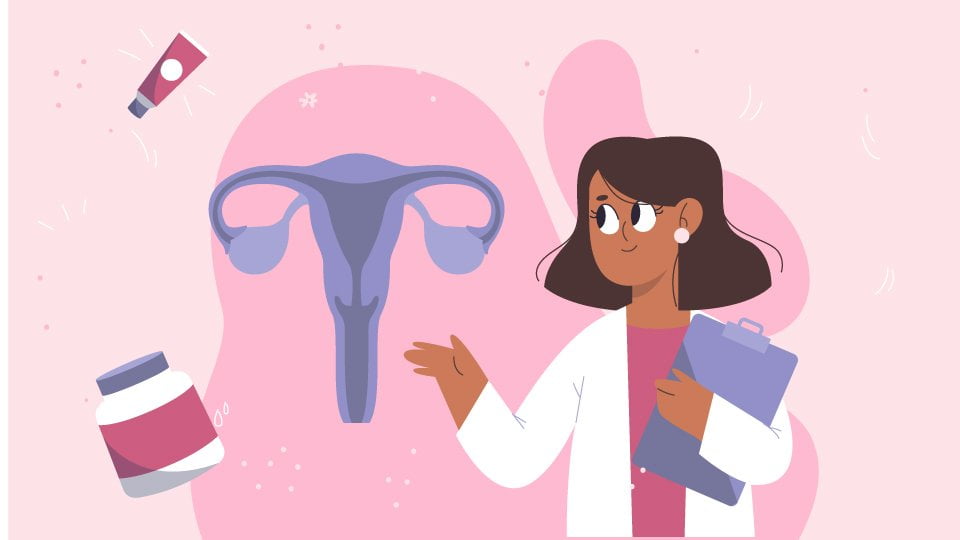Polycystic Ovary Syndrome (PCOS) and Hypothyroidism are two common endocrine disorders that affect a significant number of women worldwide. These conditions impact reproductive health and have far-reaching effects on overall well-being. Understanding the complexities of PCOS and Hypothyroidism and adopting a holistic treatment approach is crucial for managing these conditions effectively. In this blog, we will delve into the symptoms, causes, and treatment options for PCOS and Hypothyroidism, emphasizing a comprehensive and integrative approach.
Contents
Are PCOS and Hypothyroidism Interlinked?
Polycystic Ovary Syndrome (PCOS) and Hypothyroidism are two distinct medical conditions, but there can be interconnections between them. While they have different primary causes and manifestations, they share certain similarities and can influence each other in several ways. Here are some points highlighting the potential interlinkages between PCOS and Hypothyroidism:
Insulin Resistance:
- Common Factor: Insulin resistance is a key feature in both PCOS and Hypothyroidism. Insulin resistance occurs when the body’s cells do not respond properly to insulin, leading to elevated insulin levels in the blood.
- Impact: Insulin resistance means hormonal imbalances and contributes to the development and exacerbation of both PCOS and Hypothyroidism.
Hormonal Imbalances:
- Androgens in PCOS: PCOS is characterized by elevated levels of androgens, such as testosterone. These elevated androgen levels contribute to the symptoms associated with PCOS, including irregular periods and the development of cysts on the ovaries.
- Thyroid Hormones in Hypothyroidism: Hypothyroidism involves an underactive thyroid, leading to a decrease in the production of thyroid hormones (T3 and T4). This deficiency can result in a slowdown of metabolism and various symptoms like fatigue and weight gain.
Thyroid Dysfunction in PCOS:
- Research Findings: Some studies suggest a higher prevalence of thyroid disorders, including Hypothyroidism, in women with PCOS compared to the general population. The reasons for this association are not fully understood, but it may involve shared underlying factors like autoimmune conditions or inflammation.
Impact on Fertility:
- PCOS and Fertility: PCOS is a leading cause of infertility in women due to irregular ovulation. The hormonal imbalances in PCOS can disrupt the normal menstrual cycle and impair fertility.
- Hypothyroidism and Fertility: Thyroid hormones play a crucial role in reproductive health. Hypothyroidism, if left untreated, can affect ovulation and lead to fertility issues.
Autoimmune Component:
- Hashimoto’s Thyroiditis: Hypothyroidism is often caused by autoimmune thyroiditis, specifically Hashimoto’s thyroiditis. Autoimmune conditions involve the immune system attacking the body’s tissues. Some research suggests a potential link between autoimmune conditions and PCOS, although the connection is not fully elucidated.
Different PCOS and Hypothyroidism Treatment Methods
Both conditions can influence hormonal balance, metabolism, and fertility, making their management crucial for overall women’s health. Here are some of the common treatment methods for PCOS and Hypothyroidism:
Lifestyle Modifications

Lifestyle modifications play a pivotal role in the comprehensive treatment of both Polycystic Ovary Syndrome (PCOS) and Hypothyroidism. These adjustments are integral to managing symptoms, improving overall health, and addressing underlying factors contributing to these endocrine disorders. Here, we delve into the lifestyle modifications that are commonly recommended for individuals dealing with PCOS and Hypothyroidism.
1. Dietary Changes:
- Low-Glycemic Diet: Adopting a low-glycemic diet helps regulate blood sugar levels, managing insulin resistance commonly associated with PCOS. Focus on whole foods, lean proteins, fruits, vegetables, and complex carbohydrates.
- Balanced Nutrition: Ensure a balanced intake of nutrients, including essential vitamins and minerals, to support overall health and hormonal balance.
- Iodine-rich foods: Incorporate iodine-rich foods like seaweed, fish, dairy, and iodized salt to support thyroid function.
- Selenium Intake: Include selenium-rich foods such as Brazil nuts, sunflower seeds, and poultry. Adequate selenium supports the conversion of thyroid hormones.
2. Weight Management:
- Regular Exercise: Engaging in regular physical activity is crucial for weight management and improving insulin sensitivity. Both aerobic exercises and strength training can be beneficial.
- Caloric Balance: Achieving and maintaining a healthy weight helps regulate menstrual cycles and reduces the severity of PCOS symptoms.
- Exercise Routine: Regular physical activity contributes to weight management and helps alleviate some symptoms of hypothyroidism, such as fatigue.
- Balanced Diet: A well-balanced diet supports overall health and aids in weight maintenance.
3. Stress Management:
- Mind-Body Practices: Practices such as yoga, meditation, and deep breathing help manage stress levels. Chronic stress can exacerbate symptoms of both conditions.
- Adequate Sleep: Prioritize sufficient and quality sleep, as sleep is crucial in overall hormonal balance.
4. Regular Exercise:
- Insulin Sensitivity: Exercise improves insulin sensitivity, which is particularly important for individuals with PCOS and insulin resistance.
- Hormonal Balance: Regular physical activity contributes to hormonal balance and helps manage weight.
- Metabolism Boost: Exercise helps boost metabolism, which can be beneficial for individuals with hypothyroidism experiencing weight-related symptoms.
- Energy Levels: Engaging in moderate exercise can alleviate fatigue associated with hypothyroidism.
5. Avoidance of Harmful Substances:
- Limit Alcohol and Caffeine: Moderate alcohol consumption and limiting caffeine intake can contribute to better hormonal balance and overall health.
- Avoid Smoking: Smoking can adversely affect fertility and worsen symptoms of both PCOS and Hypothyroidism.
6. Holistic Approaches:
- Acupuncture: Some individuals find acupuncture beneficial for symptom management and hormonal balance.
- Herbal Supplements: Consult with healthcare professionals about the potential use of herbal supplements, such as spearmint tea or adaptogenic herbs.
Medications

Medications are fundamental components in the treatment regimens for both Polycystic Ovary Syndrome (PCOS) and Hypothyroidism. These conditions often require targeted pharmaceutical interventions to address specific hormonal imbalances and alleviate associated symptoms. Here, we explore the common medications prescribed for individuals dealing with PCOS and Hypothyroidism:
1. Medications for PCOS:
a. Birth Control Pills:
- Purpose: Oral contraceptives are commonly prescribed to regulate menstrual cycles in women with PCOS. They contain hormones like estrogen and progestin, helping to manage hormonal imbalances and reduce symptoms.
- Benefits: Birth control pills can alleviate irregular periods, reduce acne, and control excess hair growth (hirsutism).
b. Anti-Androgen Medications:
- Examples: Spironolactone is an anti-androgen medication that can help to counteract the effects of elevated androgens in PCOS.
- Purpose: Reducing androgen levels helps mitigate symptoms like acne and excessive hair growth.
c. Insulin-Sensitizing Medications:
- Metformin: It can help to manage insulin resistance associated with PCOS. Metformin improves insulin sensitivity, helping to regulate menstrual cycles and improve fertility.
- Benefits: Metformin may assist in weight management and reduce the risk of developing type 2 diabetes.
d. Ovulation-Inducing Medications:
- Clomiphene Citrate and Letrozole: These medications stimulate ovulation and are often prescribed for women with PCOS who are trying to conceive.
- Purpose: Inducing ovulation improves the chances of successful conception.
2. Medications for Hypothyroidism:
a. Levothyroxine:
- Purpose: Levothyroxine is a synthetic form of the thyroid hormone thyroxine (T4). It is the standard medication for treating hypothyroidism and works to replace deficient thyroid hormones.
- Benefits: Helps restore normal thyroid function, alleviating symptoms such as fatigue, weight gain, and cold intolerance.
b. Thyroid Hormone Combination Therapy:
- Combination of T3 and T4: In some cases, synthetic T3 (triiodothyronine) and T4 (thyroxine) cab help to achieve a more balanced thyroid hormone profile.
- Purpose: Aim to address specific cases where T4 replacement alone may not fully alleviate symptoms.
c. Anti-Inflammatory Medications (in case of Hashimoto’s Thyroiditis):
- Corticosteroids: In autoimmune thyroiditis like Hashimoto’s, where inflammation damages the thyroid gland, corticosteroids may be prescribed to reduce inflammation temporarily.
- Purpose: Temporarily suppressing the immune response may help preserve thyroid function.
d. Adjustments in Medication Dosage:
- Regular Monitoring: Periodic blood tests are essential to monitor thyroid hormone levels. Medication dosages may need adjustments based on these test results.
Fertility Treatments
Fertility treatments are integral considerations for individuals grappling with Polycystic Ovary Syndrome (PCOS) and Hypothyroidism, especially when these conditions impact reproductive health.
- In the case of PCOS, ovulation-inducing medications like Clomiphene Citrate and Letrozole are commonly employed to regulate ovulation and improve fertility. Gonadotropins may be considered for more challenging cases, while In Vitro Fertilization (IVF) becomes a viable option for severe infertility.
- For individuals with Hypothyroidism, optimizing thyroid function through precise levothyroxine dosage adjustments is paramount for fertility.
Regular monitoring of thyroid hormones during pregnancy is essential, ensuring a stable thyroid environment for both the mother and developing fetus. Addressing underlying causes, particularly in cases of autoimmune thyroiditis like Hashimoto’s, can contribute to improved fertility outcomes.
Patient Education
Patient education is a cornerstone in the comprehensive treatment of Polycystic Ovary Syndrome (PCOS) and Hypothyroidism, aiming to empower individuals with knowledge about their conditions and enhance their active participation in managing their health. For PCOS, education revolves around understanding the hormonal imbalances, the impact on menstrual cycles, and the potential fertility challenges. Individuals are informed about lifestyle modifications, such as adopting a balanced diet, regular exercise, and stress management, which play pivotal roles in symptom management.
In the case of Hypothyroidism, patients are educated on the importance of consistent adherence to thyroid medication, recognizing symptoms of hormone imbalance, and the significance of regular thyroid function tests. Comprehensive patient education fosters informed decision-making, encourages a proactive approach to treatment, and contributes to improved overall well-being by addressing the unique needs of individuals navigating PCOS and Hypothyroidism.
How To Get Different PCOS and Hypothyroidism Treatment?

It’s important to note that seeking medical advice and treatment for conditions like PCOS and Hypothyroidism should be done under the guidance of healthcare professionals. While online resources can provide information and support, they are not a substitute for personalized medical care. Here are some reputable websites where you can find reliable information and resources related to PCOS and Hypothyroidism:
- HerMantra
- The American Thyroid Association
- PCOS Awareness Association
- WebMD
- EndocrineWeb
- Healthline –
- American Association of Clinical Endocrinology (AACE)
These websites offer comprehensive information, and educational resources, and may have community forums or support groups where individuals can share experiences and seek advice.
Conclusion
In conclusion, addressing Polycystic Ovary Syndrome (PCOS) and Hypothyroidism requires a multifaceted approach, encompassing lifestyle modifications, medications, and fertility treatments. Recognizing the interplay between these conditions is crucial for comprehensive care.
By fostering collaboration between patients and healthcare providers, a personalized treatment strategy can be developed, promoting optimal well-being and addressing the unique challenges posed by PCOS and Hypothyroidism. Remember, individualized care and regular medical supervision are key to effective management.
If you are facing PCOS-related issues, PCOS treatment at HerMantra can help. Book your free trial online Pcos treatment session now.


